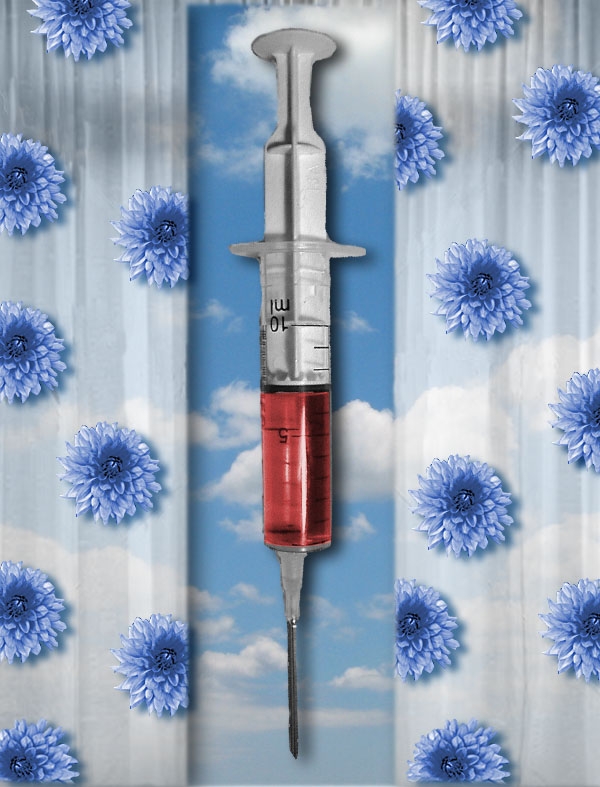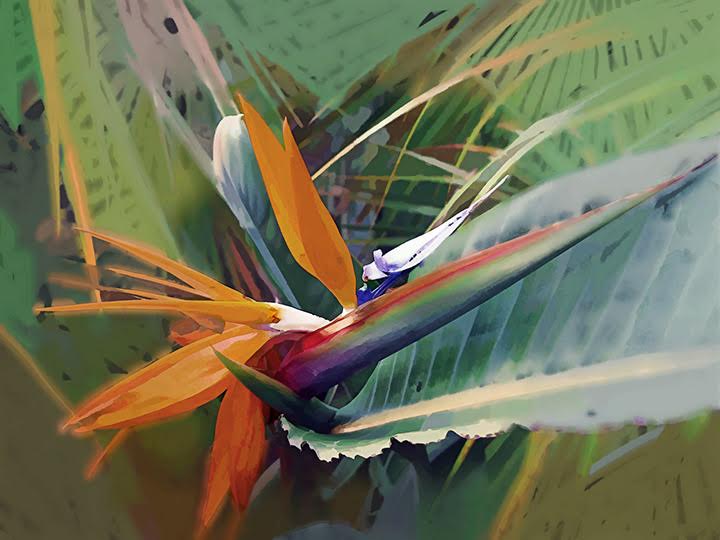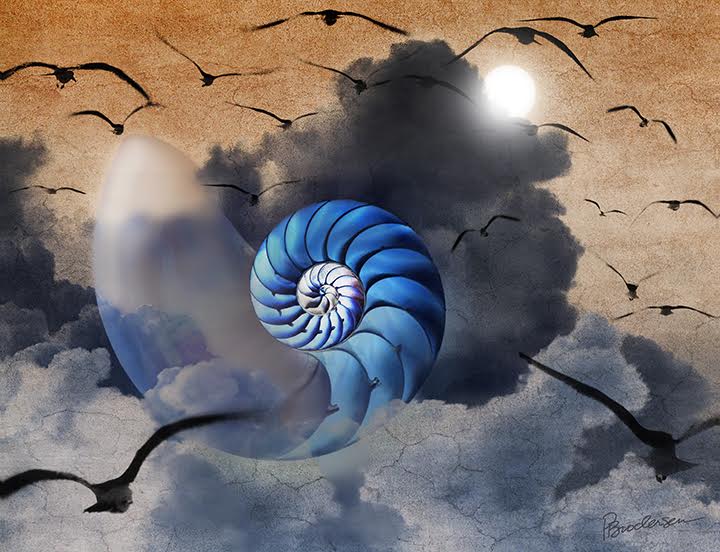
“Emotional Landscapes2,” by Penelope Breen
On the ferry ride back to Ebeye, when the boat is a quarter mile from the lagoon’s rim of reef and Kwajalein is half a mile behind them, a collection of distant white lights winking from the black horizon, Jeton jumps overboard when no one is watching. He knows to push away quickly, to avoid the tow of the boat’s churning propellers. A strong swimmer, a pair of borrowed running shoes tied around his neck, he backstrokes over the boat’s wake. It’s hard work because the tide is going out. Soon the boat is far away and Jeton is alone in the dark water. If he were on the oceanside, he would be shark bait. But here on the lagoon side, he knows there are few sharks. Still, he has to be careful.
He can hear the water slapping exposed rock on the reef a hundred yards ahead. And at last he can see the pale expanse of sand below him—and large darting fish. Above, clouds chase each other like racing ships through the whorl of stars. The moon has yet to rise. As soon as he can stand, bullied by small waves, Jeton slips on the shoes. The reef at low tide will allow him to walk back to Kwajalein. But he has to walk fast, watch for Security Patrol, and get across before the Security boat motors by with its sun-bright spot. He has to walk careful too, watch that he doesn’t slip and cut himself on the coral, which is sharp like fish knives. Salt water will ruin the leather Nikes he borrowed from cousin Mike. But fuck it.
It takes a long time, this careful walking in dark water.
As he sloshes through tide pools, slipping every other step, cursing the reef, he almost wishes a rogue wave would reach over from oceanside and pull him into the depths—then Nora would be sorry, drowned Jeton washed up on Emon beach, where Nora takes her morning swim.
When they met at a soccer game that first time, Nora said, “You’re damned reckless, you know that?” She was flirting, he knew right away. He offered her a cigarette and she said, “Are you crazy?”
“Yes,” he said.
That’s all it took. Boom! like that.
In two days she flies to the States. Four thousand two hundred miles east. What is four thousand miles to Jeton? He has flown to Guam twice. One thousand three hundred miles. That was far enough.
After the game this afternoon, when his team walked over to shake hands with her team (they beat the ri-pālle 7 to 2), he got close enough to her to whisper, “I’m gonna die if I don’t see you, jera.”
Then he heard her sigh the kind of sigh he hears Betra, his younger sister, make when she looks at the mail-order Nordstrums catalogue from the States, at all those things she knows she cannot have. Nora didn’t have time to answer him. And then she was gone, swept away with the other cheerleaders and the ri-pālle boys.
“I know, it’s hard,” Nora said at their last meeting.
“I own a fourth of Kwajalein!” he said, desperate for justification.
“You mean your grandmother does,” Nora corrected.
“Same thing!” he said.
Jeton’s grandmother gets a check every few months for leasing her part of Kwajalein to the Americans. It has been enough to buy her a condo on Guam, a new Nissan Altima LX every other year, a pork farm in Manila, but not enough to give to her huge family, every one of them with an empty hand held out. Still, she offered to buy Jeton a used Sentra and set him up in the taxi business on Majuro. Jeton pictures himself driving Majuro’s long, flat two-lane road all day, every day—ial an iroj, the King’s Road, it is called. The only road. Four or five quarters per ride. Majuro island is one mile wide and 34 miles long and 300 miles from here. They have a couple of discos and a copra plant and fifteen churches.
Fuck that.
In his mind, he hears Nora say his name, over and over. Nobody has said his name like that, like it was a valuable secret. He can smell the strawberry shampoo of her hair, the flowery scent of her body lotion—she sunburns easily. She gave him everything.
She used to say, “You’re the one, Jeton, you’re the only one.”
He knows that in her ettōnak, her awake dreams, she is already on that plane, already back in the States, going to college, dating other boys and thinking of a “major” and a life Jeton can’t begin to understand.
“I will write,” she promised.
“Yes,” he said. “Long emails.”
Now: something stutters and skips past his feet. A shrimp scuttering to safety.
Americans like to come out here with flashlights to hunt for shells at low tide. Some aren’t careful and the high tide catches them, sweeps them out to deep water and they are never found. All of this is a mystery to them, the water, the reef, the life the ri-Majeļ used to know. The ri-Majeļ were great navigators, great canoe builders. They knew how to read the waves and they made secret charts with sticks and cowries shells that enabled them to travel anywhere they pleased. No one knows how to do that any more, except at the Allele Museum on Majuro, where two old men work year-round hacking out ceremonial tipñōls, sailing canoes, for tourists to see.
Jeton once took Nora to Pikeej in his uncle’s speed boat. Pikeej is uninhabited, an overgrown coconut plantation with many hidden ruins from the World War Two, Japanese bunkers and huge oil tanks rusted orange. “Oh, God, Jeton, this is so cool,” Nora said as they combed through the jungle. Jeton had a machete, wasps bobbed over their heads, the air was sweet with the scent of kōno blossoms. They found a grassy mound that could have been a grave site or a buried ammo dump. There they slipped off their clothes and looked at each other in the filtered light. Then they kissed and kissed until their lips were raw and there was nothing left to do but exhaust each another way.
Why isn’t this good enough?
Jeton comes ashore at last, wet up to the knees. As he walks, his borrowed Nikes sound like soggy mops against a tile floor.
Nora lives in one of the new pre-fabs at this end of the island. They all look alike and, for a moment, Jeton panics, hidden in the shadow of someone’s central air. He doesn’t know if he can remember the right duplex.
Here comes the Security pickup with its big light. Lucky thing there are no dogs on Kwajalein, all that barking. Jeton scrambles farther into the shadows just as Security shoots its light where he was crouched. Truck slows to a stop, engine grumbling, light snaking through the dark stubbled yard between the pre-fabs, back porches, bamboo fence, gas grills, locked-up bicycles. Jeton pants, sucking air through his mouth, balled up behind a low fence. Shameful to be caught this way, like a shrimp curled under a rock.
If they catch him what can they do?
Last night, while drinking, one of the older men said to him: “Loving American likatu is no big deal. Everyone has a story of loving American girls.”
This is what he fears, that he is not special, that there is nothing in him that will make him different from anybody else. Doesn’t matter if his grandmother owns one fourth of Kwajalein. Doesn’t matter if he would’ve been a prince in another life. What is he now, right now?
~
The difference between Kwajalein and Ebeye starts with the streets, Jeton decides. Here, they are wide and paved and bright with electric light. The houses are neat, they all look alike, the yards are clear of motorbikes, scrap wood, trash, and chickens, and everything everywhere is green.
Jeton prefers Ebeye. Or Majuro. The haphazard houses and the sandy streets that curl and twist like vines and the animals that run freely and the children playing everywhere you turn and the cooking smells and the women singing and the laundry flagging from the lines over the dirt yards—it all feels good. The Americans’ place seems empty and haunted like Japanese war ruins on Jaluit.
Here it is, Nora’s house. Plastic Chinese lanterns of many colors glow from the bamboo’d patio. Jeton hears several girls talking, laughing. Sleepover. He has guessed right. Far from the patio fence, Jeton crouches at the trunk of a palm tree and listens. He can’t make out what they are saying. Maybe talking about hot boys. Maybe talking about college. Who can tell with girls? When there is a lull in the chatter, Jeton whistles. It is his special whistle, sounds like hissing and bird squeak at the same time. Everyone in his family does this whistle. Nora has teased him about it. “You think I’ll answer that, like a dog or something?”
He whistles again. Now the girls whisper severely to one another. A wasp’s nest. Then he hears his name, like a curse on their lips. Jeton, it’s Jeton.
And he knows that he has made a mistake. He should run, he should leave Nora alone, he should give her space, something Americans are always talking about. He is making trouble. But he can’t go, he won’t go. Not now. He will take his punishment, whatever it is, like the day he reefed his uncle’s boat, like the time he insulted his grandfather by patting him on the head like a child, like the night he got drunk and rode his brother’s bicycle off the pier.
The patio door opens, a paw of yellow light leaps into the yard, and Nora—unmistakable silhouette—walks towards him. The pink of a nearby street lamp lights her face. It is the face of a smart woman. Mālōtlōt. The kind of woman who could live happily on an outlying atoll. Who would not cringe from cleaning fish. Who would not complain when the rains came.
She is popular, she has said, because she is not pretty like those models in the Nordstrom catalogue who scare Jeton because they look so mej. Dead. “Who could love them?” he asked her. “Why do Americans think these creatures are jouj?” Questions like these delight Nora: he can make her smile. This is how it should be always.
Tonight she wears a sparkly tank-top and white shorts and her white Berkenstocks. Tall, long legs, head up like she was walking at graduation. A woman who would sail with him through Toon Milu pass, north to Rongelap or Bikar or far-away Bokak.
What can he say to make her smile now?
He remains crouched, out of respect. He wants a cigarette, something to do with his hands.
“Jeton, what are you doing?”
His listens for love in her voice, a voice so much lower than any ri-Majeļ woman or girl he knows. Americans talk deep in the throat with flat words.
“I die when I don’t see you, Nora.”
“How did you get here?”
“Walked.”
“Across the reef?” She widens her lovely eyes. “Are you crazy?”
“Yes.”
“Jeton.” Sighing, she kneels near him. But then she has nothing to say.
Her freckles, he can see them now: a thousand islands he wants to inhabit.
He says, “I don’t want you to go.” The words hurt like fish bone in his throat, make his eyes sting. As he swipes at his tears, he sees the other girls peering from behind the patio door.
Nora says, “What would I do here?” This sounds like a complaint.
He shrugs. “We could have fun.”
He wants more than fun. He is sure she knows this.
She sighs again. Is she so tired? “We have been over this several times.”
“You and me could do it, lijera, we could live on a island, just like we dreamed. You’d like it.”
“It wasn’t my dream,” she says. Then, quickly she adds: “I’m seventeen, Jeton, what do I know about living on an atoll?”
It wasn’t my dream. He tries to ignore this. Maybe all she needs is convincing.
“You could learn,” he says. “You love it here, you said so.”
“I’m seventeen!”
He says nothing, only stares at her, waiting. Then he does what the ri-Majeļ do best. He smiles.
“Why does this make you smile?” she asks.
“Seventeen, Nora. You can do anything.”
“And that’s what I want to do—anything and everything. Things I can’t do if I’m stuck on a tiny island out here in the middle of nowhere.”
“Nowhere?” There is no equivalent for nowhere in his language. Ejjeļok maybe: nothing.
“I didn’t mean it like that,” she says quickly. She touches one finger to the top of his hand.
But she does not take his hand. He feels himself sinking, like a man wallowing in wet sand. Nowhere. What is nowhere?
He sees regret in her face, that sorry look he has seen after his mother loses a day’s wages at cousin Amsa’s weekly cock fight. Gone, her look says, it’s gone.
Jeton weighs the American words of loss: nothing, none, not, no.
At last his bellen lays her hand lightly over his, brings him back abruptly, but he can hardly see her for the tide rising again in his eyes.
She says, “Jeton, don’t you have any plans?”
“College, Nora? I’m no good at school.”
“Maybe start with junior college.”
“In the States? You don’t want your ri-Majeļ boy in the States with you.”
“I didn’t say we’d be together, Jeton. I’m talking about your future, not about us.”
“You are my future.”
“I am your girlfriend, that’s all. And day after tomorrow I’m going to fly away. That’s a fact you have to accept.”
“I don’t want you to forget me,” he says.
“Why would I forget you? How could I?” She lowers her head to meet his eyes.
Sitting in the half dark, palm tops clattering above them in the breeze, the girls spying on them from the patio, Security Patrol prowling somewhere nearby—Jeton understands that he wants more from Nora than she can give him. If only he could describe his feelings, he might change her mind. But there are not enough words and they are not the right kind of words.
“You will have other boy friends,” he says.
“And you won’t ever have another girl friend? You want to mummify me or something? I’ve got my life, you’ve got yours. Maybe you’ll find your way to the States and we’ll see each other. Maybe I’ll decide I’d rather be here and I’ll come back. Who can say? Anything can happen, just like you and I happened. “
He wishes she would take his hand, kiss it the way she used to, lay her face against his neck.
“You are right,” he says. “I am just a boy, I don’t know what I am doing.”
She smiles at him. This is what he wants, that softening, that kindness. But he is lying to her. He believes that she is making a terrible mistake, that she will be in her big, cluttered American house years from now and she will look out at her big empty yard with its too-green grass and she will think of the life she could have had here with Jeton. But he knows that he cannot stop her. He knows that, as with certain lovely fish, he has to stay clear or risk great harm.
She says, almost in a whisper, “I’m not sorry for what we had, are you?”
“No, I am not sorry,” he says. She will haunt him, he knows. He will see her always in his head: Nora running, Nora laughing, Nora waving to a friend, Nora’s long fingers combing through his hair, Nora kissing him on the nose.
“Are you going to be all right?” she asks.
“I’m cool.” Saying what the American boys always say.
“You’re not going to do something crazy?”
“I will hang out till morning, then take the ferry back, OK?”
“Why don’t you sleep on Brit’s patio—we’ll go inside.” She offers him her kindest smile. “Please?”
It is impolite to deny an offer of hospitality. And he wants to make her happy. And he would like to be near her. Maybe in the morning she will change her mind. He knows this is a slim chance but it is more than he had a few minutes ago.
She does not kiss him when she says good night from the back door of Brit’s house. He is sitting on the patio hammock, which swings slightly beneath him. The patio smells like candy sweetness. Girls. Jeton nods his goodnight to Nora, watches her close the door and disappear into the darkness beyond the kitchen. She feels sorry for him. That is not good. She will return in the morning to find him curled on the hammock like a stray dog. And he will smell of tonight’s hard walking. And she will be eager to get home because she is excited about her trip. She is going places. 4,250 miles. And he is going to Ebeye. He is not going to college. He is not going to the States.
He does not lie down; there is no sleep in him. He leaves the patio, the girlish sweetness still in his lungs. Sadness makes his heart feel like it is a piece of water-soaked wood. Sodden and sluggish. He stands in the street and stares up at the duplex, at the light in Brit’s window. He imagines the girls will whisper all night long. They will give Nora advice, tell her how to dump Jeton in the morning.
He doesn’t know how long he stands out here. A long time.
Then he hears a truck approaches. Security Patrol. But Jeton does not think fast enough to run. And suddenly it looks like morning, so much light around him.
He turns to the light. Truck light.
“Don’t move, son.”
It is the big-bellied black American officer named Ulysses. With a grunt of effort he steps out of the pickup. He reminds Jeton of his third uncle on his father’s side. Except this man has no sideburns. The officer squints through the smoke of his cigarette, which he keeps at his mouth. He has his right hand on the gun at his wide leather belt. His other hand holds a big flashlight. Truck’s spot makes Jeton squint hard.
“You got I.D.?” the officer asks. He stands to one side of the truck. Garble stutters through the little black radio attached to his shirt pocket. It looks like the weight of the man should pull him over.
Jeton slides his Velcro wallet out of his back pocket. Slowly. Everybody knows you have to move slow in front of Security.
The officer takes the wallet, flips it to the I.D. “Jeton DeGroen,” he says. Flashlight on the I.D. “I heard about you. Your grandma owns half the island.”
“A fourth.”
The officer smiles, shakes his head like he knows something Jeton doesn’t. “She gets a lot of money for that land. And I bet you see some of it.”
Jeton wants to tell him that the land means nothing, it has always been here, it will stay here until the ocean decides to swallow it. He remembers what the teachers told him about how these atolls began. Coral attached itself to volcanoes and kept growing as the volcanoes sank. After a long time, the volcanoes were gone, sunken deep under water. But the coral remained, a circle of coral where the volcano used to be. That’s what he feels inside him now, Nora gone but a hard crust left behind.
He says, “She has offered to buy me a used Toyota so I can have a taxi business on Majuro.”
“There you go.”
“Taxi’s not my style.”
“Neither is obeying the law apparently.” The officer flicks away his cigarette, turns his head to the radio at his shoulder and says, “Got a code 40. Bringing him in, ten-four.” Then he says to Jeton: “What’s your excuse for breaking curfew, little man?”
“I don’t need excuse.”
“You better think one up.”
In another life Jeton DeGroen would be a prince!
When Jeton doesn’t answer, the officer says, “Man, in the States we’d send you to a work farm.” He lights another cigarette with a silver Zippo lighter, like all the Security have, and doesn’t seem in a hurry to go. Maybe because Jeton is so relaxed. Late night like this makes some people want to stand around and talk. Always somebody talking late on Ebeye—Jeton hears them every night, two or three people off here and there, smoking and talking.
“Got a smoke?” Jeton asks.
“Take the pack, little man.” The officer tosses the cigarettes to him.
Like a fish flying from a wave, Jeton leaps forward—not for the cigarette pack but for the officer’s big waist. Tackle him, he tells himself. Tackle him, then run away. It’s not a plan exactly, it just happens. Boom! It reminds him of soccer, of diving for a shot that saves the game, his reflexes so quick, his jump so surprising, that it makes the American girls on the sidelines cheer, even though they are not supposed to cheer for the ri-Majeļ, and then one of them, he notices, the tall, pretty one, flashes him her smile and Jeton knows he shouldn’t give a second look, he knows that American girls are trouble, everyone says so, he really should leave them alone. Do not smile back! he cautions himself. But she is tall and freckled and beautiful, Miss America, and he is the center of her attention now—he remembers this so clearly, the cheering in his ears as loud as waves crashing over him. Of course he smiled back. Boom!
Ron Tanner’s awards for writing include a Faulkner Society gold medal, a Pushcart Prize, a New Letters Award, a Best of the Web Award, a Maryland Arts Council grant, and many others. He is the author of four books, most recently Missile Paradise, a novel. He teaches writing at Loyola University-Maryland and directs the Marshall Islands Story Project.










